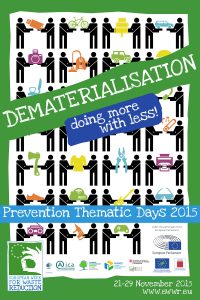The consumption of products (including their production, transport and distribution), represents nearly 50% of emissions contributing to climate change. If not transferred into reuse schemes, these products will eventually become waste that needs to be managed. That waste requires more collection and treatment infrastructures, the cost of which puts a strain on the budgets of local and regional public authorities. It is therefore of crucial importance to reduce waste at the source. One way to put this into action is smart consumption:
Dematerialisation: Doing more with less!

What is dematerialisation?
Dematerialisation stands for using less or no material to deliver the same level of functionality to the user. Concretely this includes two aspects:
a) Shift from products to services
Replacing products with services, sharing and borrowing products, and the organisation of group services instead of individual ownerships is one aspect of dematerialisation. In everyday life this could involve you renting tools from your neighbour or colleague, being part in a car sharing network instead of owning a car, listening to music via digital music distribution systems instead of buying CDs, etc.
b) Improved material use
Another aspect of dematerialisation is the absolute or relative reduction in the quantity of materials required to satisfy needs in society. That would include increasing the efficiency of material use (using less materials for a specific function) and substituting materials (exchanging heavy materials with light materials), but also reusing products.
In 2015, the Prevention Thematic Days focused on how to do more with less.
Find out all about the Prevention Thematic Days 2015 – Dematerialisation: Doing more with less! in this report.
To highlight this topic and to encourage and support EWWR Action Developers to implement actions around this issue, a number of tools have been developed.
Factsheets and activity sheets
- Dematerialised presents
- Ecodesign contest
- Ecodesign workshop
- Material waste reduction workshop
- Packaging waste reduction workshop
- Paper waste reduction
- Reuse market
- Setting up a sharing network
- Swapping event/service
Support documents are available in our archive!
 EN (full site)
EN (full site) ITA
ITA FRA
FRA POR
POR ESP
ESP CAT
CAT DEU
DEU NED
NED HUN
HUN